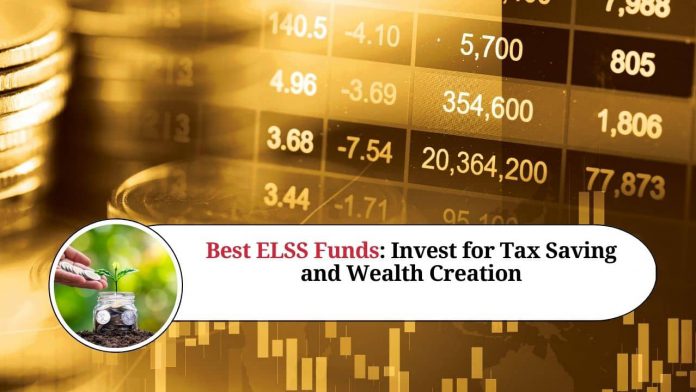Invest in the Best ELSS Funds for Tax Savings and High Returns
ELSS, or Equity-Linked Savings Scheme, is a type of mutual fund that not only provides tax benefits but also helps investors create wealth in the long run. ELSS funds invest predominantly in equities, with a lock-in period of three years. In this blog, we will discuss the best ELSS funds in India based on various parameters.
What are the parameters to consider while choosing the best ELSS funds?
- Performance: Past performance of the fund is an essential criterion to consider. Check the fund’s track record and performance over different time frames to assess its consistency.
- Fund Manager: The fund manager’s experience, performance track record, and investment strategy are critical factors to evaluate before selecting a fund.
- Expense Ratio: ELSS funds charge an expense ratio for managing the fund, which directly impacts the returns earned. Lower expense ratios can lead to higher returns.
- Assets Under Management (AUM): The size of the fund’s AUM can be an indication of its popularity among investors. However, it is essential to ensure that the fund’s AUM is not too large, as it may affect the fund’s performance.
Top ELSS Funds in India
- Axis Long Term Equity Fund: Axis Long Term Equity Fund is a top-performing fund that has consistently outperformed its benchmark index. The fund invests in a diversified portfolio of equity stocks and follows a growth-oriented investment approach. The fund has an expense ratio of 0.93%.
- Mirae Asset Tax Saver Fund: Mirae Asset Tax Saver Fund is another top-performing fund that has given excellent returns in the last few years. The fund manager follows a bottom-up approach and invests in companies with high growth potential. The fund has an expense ratio of 0.80%.
- Aditya Birla Sun Life Tax Relief 96: Aditya Birla Sun Life Tax Relief 96 is a well-established ELSS fund that has been in existence for over two decades. The fund has delivered consistent returns over the years and follows a blend of growth and value investment style. The fund has an expense ratio of 1.04%.
- DSP Tax Saver Fund: DSP Tax Saver Fund is a well-diversified fund that invests across sectors and market capitalizations. The fund has a consistent track record of delivering returns and follows a disciplined investment approach. The fund has an expense ratio of 0.96%.
- ICICI Prudential Long Term Equity Fund: ICICI Prudential Long Term Equity Fund is a large-cap biased fund that invests in high-quality stocks with a long-term investment horizon. The fund has an expense ratio of 1.15% and has delivered consistent returns over the years.
ELSS funds are a popular investment option among investors looking to save taxes and create wealth. The lock-in period of three years for ELSS funds makes them a suitable option for those who are looking to save taxes for the long term. Additionally, ELSS funds also offer the potential for higher returns as they predominantly invest in equity stocks.
When choosing an ELSS fund, investors must consider several parameters. One of the essential factors is the fund’s performance over different time frames. While past performance does not guarantee future returns, it is an essential criterion to assess the fund’s consistency and potential to generate returns.
The fund manager’s experience, investment strategy, and performance track record are also critical factors to evaluate before selecting a fund. A good fund manager can significantly impact the fund’s performance and help generate better returns for investors.
The expense ratio is another important factor to consider. ELSS funds charge an expense ratio for managing the fund, which is deducted from the investors’ returns. A lower expense ratio can lead to higher returns and should be preferred by investors.
The size of the fund’s AUM is also an important factor to consider. While a large AUM may indicate the fund’s popularity among investors, it can also affect the fund’s performance. A large AUM may limit the fund manager’s flexibility to invest in high-quality stocks, leading to lower returns.
The top ELSS funds discussed in the previous section have consistently delivered excellent returns and are considered among the best in the industry. However, investors must conduct their due diligence and consult with their financial advisor before investing in any fund.
In conclusion,
ELSS funds are an excellent investment option for those looking to save taxes and create wealth in the long run. Investors must consider various parameters such as performance, fund manager, expense ratio, and AUM before selecting a fund. The top ELSS funds discussed in this blog have a track record of delivering consistent returns and can be considered by investors looking to invest in ELSS funds.
Other Related Blogs: Section 144B Income Tax Act
Frequently Ask Question
Q:1) What is an ELSS fund?
A: An ELSS fund is an Equity-Linked Savings Scheme, which is a type of mutual fund that predominantly invests in equities. ELSS funds offer tax benefits under Section 80C of the Income Tax Act, and have a lock-in period of three years.
Q:2) Why should I invest in ELSS funds?
A: ELSS funds offer dual benefits of tax savings and long-term wealth creation. Additionally, ELSS funds have the potential to generate higher returns than traditional tax-saving instruments such as Public Provident Fund (PPF) and National Savings Certificate (NSC).
Q:3) What are the parameters to consider while selecting the best ELSS fund?
A: The key parameters to consider while selecting the best ELSS fund include the fund’s performance, fund manager’s experience and track record, expense ratio, and assets under management (AUM).
Q:4) What is the lock-in period for ELSS funds?
A: ELSS funds have a lock-in period of three years, which means that investors cannot redeem their units before the completion of three years from the date of investment.
Q:5) What is the tax benefit offered by ELSS funds?
A: Investments in ELSS funds are eligible for tax benefits under Section 80C of the Income Tax Act, which allows a deduction of up to INR 1.5 lakhs from the taxable income.
Q:6) Can I switch between ELSS funds?
A: Yes, investors can switch between different ELSS funds. However, it is essential to consider the tax implications and exit loads before making any switches.
Q:7) How can I invest in ELSS funds?
A: Investors can invest in ELSS funds through various channels, including online platforms, direct investments, and through a financial advisor. It is essential to choose a reliable and trustworthy platform or advisor for investing in ELSS funds.
Q:8) What are the risks associated with investing in ELSS funds?
A: ELSS funds invest in equities and are subject to market risks. The returns from ELSS funds are not guaranteed, and investors may experience fluctuations in the value of their investment. It is essential to understand the risks associated with investing in ELSS funds before making any investment decisions.




















